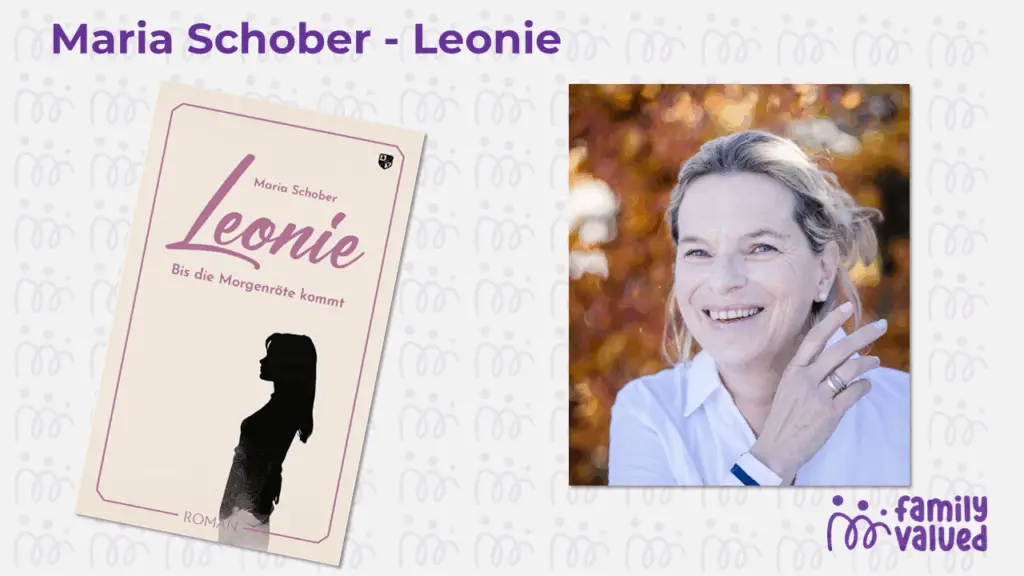The Author
This blog usually reviews non-fiction books, but today we have a novel. Austrian author Maria Schober aims to give artistic form to her pro-life witness, and she firmly believes that a novel is better suited to this witness than a fact-based defence. The dialogues in the book give the impression that the author lives in the Salzburg area, and that she is deeply rooted in her Catholic faith.
The storyline
The novel is full of suspense, making it hard to put down, and the mystery is not solved until the end of the book. So, what is the book about? Leonie, a young woman in her mid-twenties, is full of drive in her new job. She is eager for success, self-realisation, and self-determination. She is still single, but has a budding relationship in Salzburg. Her parents, like her, live in Salzburg, while her grandmother resides in Vienna. In the first chapters, the reader is introduced to Leonie and her surroundings. Oh and lest I forget, she has a sister named Lilly with three children, and a fourth on the way.
Leonie adores her grandmother, Gertrud, and the feeling is mutual. The relationship between Leonie and Gertrud is full of trust and mutual admiration. Gertrud, in her youth, had lived quite freely in Paris, thoroughly enjoying Parisian scene in the late 1960s; and this impresses Leonie deeply. Her own mother, on the other hand, is rather stuffy and not very self-determined – at least in Leonie’s eyes.
One day, Leonie visits her grandmother in Vienna. After an extended coffee session, she decides not to go straight home, but to visit a club instead. Just as she arrives, the band strikes up a tango, and a handsome young man invites her to dance. Between dances, they drink a good deal. Leonie feels rather uneasy about the man’s behaviour. She senses his hands on her intimate parts, but having drunk rather a lot, puts up no resistance. This goes on for a while, then all goes blank. What exactly happened next, she does not know to this day.
All she knows is that she woke up naked in a strange bed in a strange apartment. How she got there and who else was in bed remains a mystery. The apartment is empty. She gets dressed and drives back home to Salzburg. She feels confused; as though she is in the wrong film. What has happened? She realises it was a one-night stand, with partner and outcome unknown. However, she wants answers, and so she takes a pregnancy test. The result is positive.
Here, the novel truly picks up pace. We have the perfect setting for a pro-life essay. Leonie’s first reaction is defiance; that is, her self-determination as a woman takes precedence over the child. Career must come first. A child from an unknown partner, right in the middle of pursuing a career, is absolutely out of the question; abortion is the only way out – or so she believes.
Her boyfriend Andreas passionately defends the Church’s position: “Contraception damages the dignity of the woman.”
Leonie is well-connected and asks her girlfriends more or less openly for their opinions. She also asks her boyfriend Andreas. His opinion is clear: no abortion. Leonie does not want to ask her mother, as she is too conservative.
In a specialised blog, she comes across a person who can relate well to her situation. Leonie values this person’s opinion. Her advice is: don’t rush into anything and consider other options, not just abortion.
Caught in the back-and-forth of opinions, Leonie seeks clarity. “Gertrud is my last resort,” she decides. Leonie drives to Vienna on an impulse. Here, the other side of the coin is revealed. Life back then in Paris with its “free love” had its pitfalls. Gertrud had two abortions during her time in Paris, and the memory of them still haunts her today. She wishes she could undo them. Her grandmother’s experience shakes Leonie’s resolve. Based on her own experience, Gertrud advises Leonie to carry the child to term.
“When a woman feels loved, she becomes beautiful,” Gertrud says.
Even Lilly, her sister, struggles with the idea of a fourth child. She, too has considered abortion but has since changed her mind. Over the past few months, Leonie has come to realise that she has developed an emotional bond with the unborn child. But what should she do?
Leonie drives to Vienna, to the apartment of the tango dancer. Marco, as he is called, does not want to take responsibility for the child. What now?
Her grandmother, Gertrud, says: “I believe we need a new feminism. A feminism that sees women as they truly are.”
Leonie returns home to Salzburg and visits her boyfriend, Andreas. He declares himself willing to take on the role of father for the unborn child. Leonie and Andreas get married, thus saving both mother and child.
Thus, the novel ends happily. My hunch was confirmed: when no solution was in sight, halfway through the novel, I had thought how simple and beautiful it would be if Andreas were to take on both the mother and the child. Quite independently, Ms. Schober and I had arrived at the same solution.
The Insights
Leonie exemplifies many young women of our time: career-oriented, self-determined, but also vulnerable. The unplanned pregnancy challenges her worldview and forces her to confront fundamental questions of life – self-determination versus responsibility for a child.
The Conclusion
The novel captivates the reader. The scenes are concise, as in a theatre play; the style both simple and elegant.
Highly recommended.

